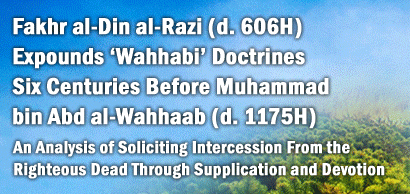| Monday, 05 January 2026 |
|
|
|
You are here:
 The Two Types of Innovation: Haqeeqiyyah and Idaafiyyah The Scholars of Ahl al-Sunnah have explained that innovation is of two types. That which is haqeeqiyyah, meaning proper innovation, in every sense of the word. It has absolutely no association to, or basis in the Shari'ah. It is when a person seeks nearness to Allaah through something that the Messenger (alayhis salaam) never sought nearness to Allaah with at all, in its very foundation. From the examples of this type of innovation is seeking nearness to Allaah through celebrating birthdays, or through dancing and music, or through acting. As for that which is idaafiyyah (relative), this is when a person seeks nearness to Allaah on account of something by which nearness is in fact sought with Allaah in its foundation (asl), but to which he adds something which takes it away from the form that it came with in the Shari'ah and this is done in respect to six matters:
And an illustration of each is as follows:
al-kam (number): This is when a person worships Allaah through altering the number as it relates to acts of worship, such as praying four rakahs for maghrib, or stoning the jamarat in Hajj ten times instead of seven, or making dhikr of Allaah through adkhaar a certain number of times that is not established in the Sunnah, such as repeating it five times, when the Sunnah says three and so on. The majority of innovations are idaafiyyah (relative) and it is why innovation is deceptive and appealing because it does not appear to be inherently evil, rather it appears as goodness, resembling the Shari'ah in its essence or foundation, but opposing the Shari'ah in the abovementioned matters. And this is what indicates the great evil of innovation in that it is alluring and hardly appears to be misguidance. It is for this reason that the Messenger (alayhis salaam) would make a recurring warning against innovatoins, their misguidance and evil. Understanding the Nature of the Argument of the innovators in Justifying innovation A point worthy of mentioning here, and it will be addressed in other articles too, is that:
One of the arguments used by the grave-worshippers and innovators is that what they perform of innovations have a basis (asl) in the Shari'ah and as such they are "good innovations (bid'ah hasanah)" and not "evil innovations." Then they make use of the statements of certain scholars which they wrongly believe support them in this classification. This is not the place to address that particular doubt, but the point we wish to make here is that when you present all of the examples and illustrations given above such an individual will never be able to dispute the fact that all acts of worship have come in the Shari'ah restricted and specified in terms of their number (kam), form (kayf), type (jins), sabab (reason), zaman (time) and makan (place). In practical experience, we have never come across anyone who is able to dispute this matter, especially when given the practical examples of how acts of worship which have a foundation in the Shari'ah are done in a way other than what the Shari'ah has come with. Given a person's acceptance of this matter of fact, their claim that their innovation is "good" because it has a foundation in the Shari'ah is invalidated. Rather, it is an evil innovation (as are all innovations in the religion) because it is in opposition to the Shari'ah in its form and detail. That the Salaf rejected innovations which in their basis have a foundation in the Shari'ah but in their details depart from the Shari'ah is a matter that is firmly established in the narrations, and such narrations will be presented in their own right in other articles. Refer to:
Link to this article: Show: HTML Link • Full Link • Short Link
Related Articles:
You must be registered and logged in to comment. |
|
||||||||||||||||
 |
 | |
|
|









